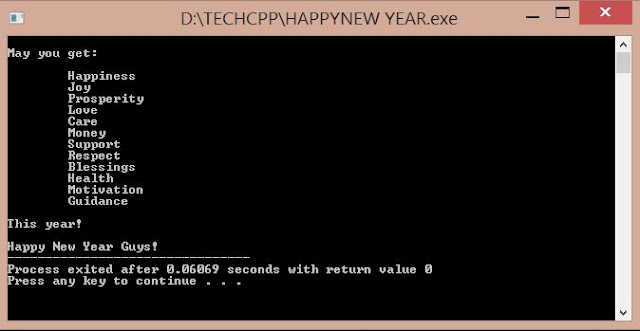SWITCH
switch(expression)
{
case constant-expression :
statement(s);
break; //Optional
case constant-expression :
statement(s);
break; //Optional
default : //Optional
statement(s);
}
PROGRAM
// Program to illustrate use of switch case without break
#include <iostream>
using namespace std;
int main()
{
switch(2017)
{
case 2017:
{
cout<<"\nMay you get: \n";
}
case 1:
{
cout<<"\n\tHappiness";
}
case 2:
{
cout<<"\n\tJoy";
}
case 3:
{
cout<<"\n\tProsperity";
}
case 4:
{
cout<<"\n\tLove";
}
case 5:
{
cout<<"\n\tCare";
}
case 6:
{
cout<<"\n\tMoney";
}
case 7:
{
cout<<"\n\tSupport";
}
case 8:
{
cout<<"\n\tRespect";
}
case 9:
{
cout<<"\n\tBlessings";
}
case 10:
{
cout<<"\n\tHealth";
}
case 11:
{
cout<<"\n\tMotivation";
}
case 12:
{
cout<<"\n\tGuidance";
}
default:
cout<<"\n\nThis year!";
cout<<"\n\nHappy New Year Guys!";
}
}
OUTPUT

